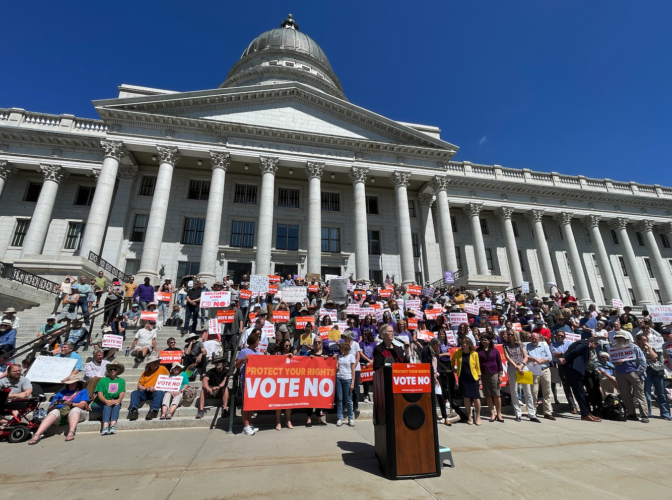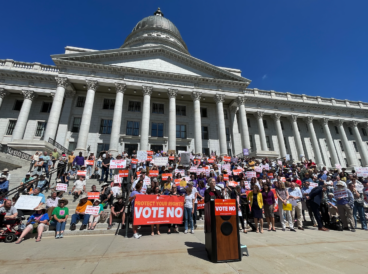A redistricting arms race is unfolding. A looming court ruling may push Utah into the spotlight

Katie McKellar, Utah News Dispatch
A coalition of anti-gerrymandering groups urge Utah voters to reject a constitutional amendment on ballot initiatives during a rally at the Utah Capitol in Salt Lake City on Aug. 26, 2024.The nation is at the cusp of a redistricting arms race, sparked by a rare mid-decade redistricting fight in Texas and fanned by other states like California signaling they’re willing to pause their own independent redistricting rules if Texas Republicans get their way.
While other states, both red and blue, eye changes to their own congressional maps ahead of 2026 to gain partisan advantages, it’s possible Utah could also be propelled into the national redistricting spotlight — but for reasons that have been years in the making.
Any day now, a district court judge is expected to rule in a longstanding redistricting lawsuit that has the potential — if the judge sides with plaintiffs — to force the Republican-controlled Utah Legislature to scrap the congressional boundaries it last set in 2021. Before then, one of Utah’s four U.S. House seats was a competitive seat for Democrats. Today, Republicans consistently dominate all four.
Utah’s ongoing redistricting battle
In the Utah redistricting lawsuit, plaintiffs argue lawmakers violated the Utah Constitution when they repealed and replaced a 2018 voter initiative creating an independent redistricting commission, then used the replacement law to adopt a congressional map that cracked Democratic strongholds.
The anti-gerrymandering group Better Boundaries, the group that successfully pursued that 2018 voter initiative known as Proposition 4, has been closely watching Utah’s lawsuit — and is now watching with dismay as Texas, California and other states engage in redistricting wars.
Elizabeth Rasmussen, who in March replaced Katie Wright as Better Boundaries’ executive director, told Utah News Dispatch on Thursday that she worries Republicans and Democrats are heading toward a point of no return.
“It’s very disheartening to see that we have national acceptance of just blatantly partisan gerrymandering to gain an advantage,” she said. “It’s obviously something that we’ve been against from the beginning. That’s how we started.”
She fears the “domino effect” could jeopardize efforts for nonpartisan, fair redistricting processes to represent voters across the country, but also here in Utah.
“We have Texas, and then we have trigger laws in California that could go into effect for redistricting there to even the playing field, and then it just keeps cascading down,” she said, noting other states including Illinois and New York are now eying their own redistricting plans.
While Utah, for now, is in a holding pattern while it awaits a court decision, Rasmussen said a ruling could thrust Utah into the redistricting wars, one way or another.
“We are expecting a ruling any day now,” she said. “So I don’t know when that will happen, but whenever it does … Utah will be in the spotlight.”
While Texas Republicans’ mid-decade redistricting effort comes at the prompting of President Donald Trump “purely for partisan advantage,” Rasmussen said, Utah’s (if the judge sides with plaintiffs) would be court-ordered.
But even if anti-gerrymandering plaintiffs get a favorable ruling in the Utah court case, Rasmussen worries that openly partisan gerrymandering playing out in states like Texas and California could “embolden” the Utah Legislature “to continue to ignore these processes.”
“If there’s retaliatory redistricting in other states, will that put our independent redistricting commission in jeopardy?” she said. “There’s a lot of possibilities here, but I don’t see many positives from it.”
Better Boundaries foresees three scenarios that could play out, depending on the judge’s looming decision. One would be a “complete victory” for plaintiffs — if the court reinstates Proposition 4 and orders new congressional maps for 2026. Another, a “partial victory,” would be that the court reinstates Proposition 4 but requires additional proceedings before new maps can be ordered. Or plaintiffs could lose, and the court could side with the Legislature’s authority to repeal voter initiatives.
Regardless of what happens, more court appeals are likely, whether that’s from state leaders or from the plaintiffs.
And as time goes on, even if plaintiffs get a favorable ruling, the likelihood of new maps being drawn in time for the 2026 election is dwindling. Utah election officials have said in court documents that ahead of next year’s election, boundaries would need to be set by this November.
“The longer it takes to get a ruling, the more challenging it becomes to get fair maps or these new maps before 2026,” Rasmussen said. “Not impossible, but yeah. It does get more difficult. As we’ve seen through this whole case, things continue to be delayed and take a long time. We prefer (a decision) sooner rather than later.”
If not 2026, though, it’s possible new maps would be redrawn before the 2028 election. It all depends on what happens next in the lawsuit.
A Utah Republican congressman opposes mid-decade redistricting
One member of Utah’s all-Republican congressional delegation has opposed the mid-decade redistricting efforts playing out in Texas, making him the first member of the U.S. House GOP leadership to speak out against it. Moore is vice chair of the House Republican Conference.
“I do not agree with state efforts to redistrict mid-decade,” Rep. Blake Moore, R-Utah, said in a prepared statement, first reported by The Salt Lake Tribune. “It undermines established norms and gives blue states a glaring green light to do the same. Partisan gerrymandering is clearly done by both sides, but to allow this wildfire to spread mid-decade is a step too far.”
Before Moore was first elected to Congress in 2020, Moore helped lead Better Boundaries’ efforts. But in 2021, he supported the Utah Legislature’s redistricting efforts. Then in 2023, he joined Utah’s three other GOP congressmen in writing a brief submitted to the Utah Supreme Court that argued the U.S. Constitution offers no protections against partisan gerrymandering.
Moore’s office on Thursday did not immediately respond to requests asking about Moore’s current stance on Utah’s redistricting lawsuit and whether he supports the idea of an independent redistricting commission, given his past involvement with Better Boundaries.
Rasmussen said she agrees with Moore’s comment that mid-decade redistricting is wrong, but she said partisan gerrymandering in general should be opposed more wholeheartedly.
“I just hope that those who have stood against gerrymandering in the past would continue to stand on that principle,” she said. “I know it’s tempting to fight fire with fire, and it’s hard to fight one side that’s playing with unfair rules, but if we don’t continue to stand up for what the right process is, I don’t see a natural ending point to what’s happening.”
Utah News Dispatch is part of States Newsroom, the nation’s largest state-focused nonprofit news organization.



